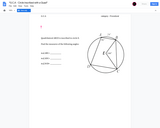
Students are asked to find the angle measurements of a figure inscribed within a circle.
- Subject:
- Geometry
- Mathematics
- Material Type:
- Assessment
- Author:
- Madison Metropolitan School District
- Date Added:
- 04/10/2019

Students are asked to find the angle measurements of a figure inscribed within a circle.

This module brings together the ideas of similarity and congruence and the properties of length, area, and geometric constructions studied throughout the year. It also includes the specific properties of triangles, special quadrilaterals, parallel lines and transversals, and rigid motions established and built upon throughout this mathematical story. This module's focus is on the possible geometric relationships between a pair of intersecting lines and a circle drawn on the page.
Find the rest of the EngageNY Mathematics resources at https://archive.org/details/engageny-mathematics.
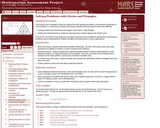
This lesson unit is intended to help teachers assess how well students are able to use geometric properties to solve problems. In particular, the lesson will help you identify and help students who have the following difficulties: solving problems by determining the lengths of the sides in right triangles; and finding the measurements of shapes by decomposing complex shapes into simpler ones. The lesson unit will also help students to recognize that there may be different approaches to geometrical problems, and to understand the relative strengths and weaknesses of those approaches.

Geometry in Construction
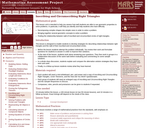
This lesson unit is intended to help teachers assess how well students are able to use geometric properties to solve problems. In particular, it will help you identify and help students who have difficulty: decomposing complex shapes into simpler ones in order to solve a problem; bringing together several geometric concepts to solve a problem; and finding the relationship between radii of inscribed and circumscribed circles of right triangles.

(Nota: Esta es una traducción de un recurso educativo abierto creado por el Departamento de Educación del Estado de Nueva York (NYSED) como parte del proyecto "EngageNY" en 2013. Aunque el recurso real fue traducido por personas, la siguiente descripción se tradujo del inglés original usando Google Translate para ayudar a los usuarios potenciales a decidir si se adapta a sus necesidades y puede contener errores gramaticales o lingüísticos. La descripción original en inglés también se proporciona a continuación.)
Este módulo reúne las ideas de similitud y congruencia y las propiedades de la longitud, el área y las construcciones geométricas estudiadas durante todo el año. También incluye las propiedades específicas de los triángulos, cuadriláteros especiales, líneas paralelas y transversales, y movimientos rígidos establecidos y construidos sobre esta historia matemática. El enfoque de este módulo está en las posibles relaciones geométricas entre un par de líneas de intersección y un círculo dibujado en la página.
Encuentre el resto de los recursos matemáticos de Engageny en https://archive.org/details/engageny-mathematics.
English Description:
This module brings together the ideas of similarity and congruence and the properties of length, area, and geometric constructions studied throughout the year. It also includes the specific properties of triangles, special quadrilaterals, parallel lines and transversals, and rigid motions established and built upon throughout this mathematical story. This module's focus is on the possible geometric relationships between a pair of intersecting lines and a circle drawn on the page.
Find the rest of the EngageNY Mathematics resources at https://archive.org/details/engageny-mathematics.
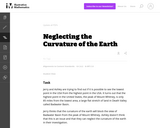
This task applies geometric concepts, namely properties of tangents to circles and of right triangles, in a modeling situation. The key geometric point in this task is to recognize that the line of sight from the mountain top towards the horizon is tangent to the earth. We can then use a right triangle where one leg is tangent to a circle and the other leg is the radius of the circle to investigate this situation.
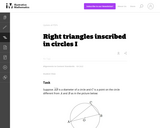
This task provides a good opportunity to use isosceles triangles and their properties to show an interesting and important result about triangles inscribed in a circle: the fact that these triangles are always right triangles is often referred to as Thales' theorem. It does not have a lot of formal prerequisites, just the knowledge that the sum of the three angles in a triangle is 180 degrees.
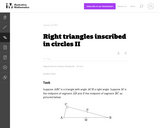
The result here complements the fact, presented in the task ``Right triangles inscribed in circles I,'' that any triangle inscribed in a circle with one side being a diameter of the circle is a right triangle. A second common proof of this result rotates the triangle by 180 degrees about M and then shows that the quadrilateral, obtained by taking the union of these two triangles, is a rectangle.
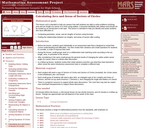
This lesson unit is intended to help teachers assess how well students are able to solve problems involving area and arc length of a sector of a circle using radians. It assumes familiarity with radians and should not be treated as an introduction to the topic. This lesson is intended to help teachers identify and assist students who have difficulties in: Computing perimeters, areas, and arc lengths of sectors using formulas and finding the relationships between arc lengths, and areas of sectors after scaling.
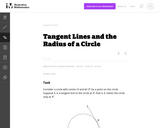
This task presents a foundational result in geometry, presented with deliberately sparse guidance in order to allow a wide variety of approaches. Teachers should of course feel free to provide additional scaffolding to encourage solutions or thinking in one particular direction. We include three solutions which fall into two general approaches, one based on reference to previously-derived results (e.g., the Pythagorean Theorem), and another conducted in terms of the geometry of rigid transformations.
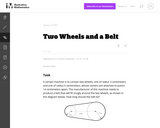
This task combines two skills from domain G-C: making use of the relationship between a tangent segment to a circle and the radius touching that tangent segment (G-C.2), and computing lengths of circular arcs given the radii and central angles (G-C.5). It also requires students to create additional structure within the given problem, producing and solving a right triangle to compute the required central angles (G-SRT.8).